Tag: Gabriella Pisano ’18
Students Participate in a Spring Break of Service: Global Service Learning Trips
by The Cowl Editor on March 17, 2017
News

by Gabriella Pisano ’18
News Staff
Typically, Spring Break is a time when you take a break from classes and relax. Whether you sit on the beach in the sun or go home to unwind, Spring Break is often seen as a time to leave the schoolwork behind. This is not so true for the students who took part in the two global service-learning trips over Spring Break.
The global service-learning trips correspond with classes that last the entire semester. This semester’s trips were to Tijuana, Mexico, and Guatemala.
The course that allowed students to travel to Tijuana is about global border crossing. “In the class, we studied the North American Free Trade Agreement. We discussed why people migrate. We learned about the history of borders and the experiences of people crossing those borders,” explained student Dee Auciello ’18. “GSL trips are so special because you come back and have the rest of the semester to reflect on what you just did with these people you’ve built foundations with.”
In the morning, students went to the work site where they helped build the foundation of a house. Later in the day they would visit different sites, such as the border that divides Tijuana and San Diego; Las Memorias, a non-profit which provides HIV/AIDS, substance abuse, and LGBT services; and Casa Del Migrantes, an organization that houses people who have recently been deported or who are preparing to cross the border.
Discussing the challenges that she faced, Rachael Johnston ’18 stated, “The topic of immigration is very controversial and hard to grasp at some points, but after making personal connections with people who have been directly affected by policies or decisions made by the U.S. government, it was especially difficult for me to return home carrying the feeling that I haven’t done enough.”
Prior to traveling to Guatemala, students on this trip were educated about international trade, politics, and coffee culture. The Global Coffee Culture course focuses on exploring the societal, economic, and cultural implications of the coffee trade worldwide.
Explaining how this trip is unique, Karlene Cudak ’19 stated, “This trip wasn’t a traditional service trip because we didn’t do physical service while we were in Guatemala. Our service begins now and will continue after our semester ends because our class in armed with a great amount of knowledge and stories from this trip, which we will continue to use to improve our consumer activities while trying to better those of the people around us as well.”
While students who participated in these trips took a break from the classroom, they continued to learn through their service and immersion into the cultures of the places they visited.
“There is no possible way to learn what we learned and experienced in Guatemala in a traditional classroom setting,” explained Cudak.
While this is not what most would consider a typical “Spring Break experience,” students who participated in these trips seem to agree that they would not have wanted to spend Spring Break any other way.
Johnston, who traveled to Tijuana for the global service-learning trip for the second time, stated, “I would say that it is absolutely a worthwhile Spring Break trip. Not only are students immersing themselves in a different culture and being pushed out of their comfort zones, they are making relationships with other PC students they might not have known otherwise and have the chance to learn about a very important issue first hand from people being affected by it.”
PC Officer Gives Free Life Advice to Students
by The Cowl Editor on March 3, 2017
News
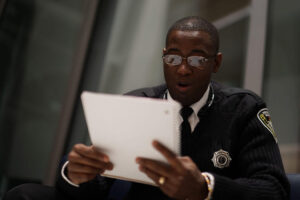
by Gabriella Pisano ’18
News Staff
The skills that people acquire throughout their lives can be put to use in many different ways. Providence College Security Officer Chris Baxter is a prime example of this, and wants to see students achieve and become their best selves. Baxter wants to see PC students succeed in knowing themselves, and using his multitude of skills and talents, specifically handwriting analysis, he can do just that.
Baxter started working as a security officer about nine months ago. In his job, he ensures safety by patrolling campus, getting an overall feel for situations, and stepping in if anything stands out. Additionally, the self-defense class at the College is taught by Baxter. “I’m a customer service of sorts. I’m a friendly face around to be as helpful as possible,” he said.
After studying culinary arts at Johnson and Wales University, Baxter had a professional cooking career for 15 years. He later worked as a computer technician, teaching people how to fix computers. With an interest in computers, he was planning on focusing on computer forensics. He was working on certification for this when a friend told him about the available position at PC. After talking to his wife of 25 years, he decided that he would apply, with the mentality that “if it’s supposed to be then it should be.”
Along with his interests in the culinary arts and computers, Baxter was a professional fighter, teaches tai chi, and is an avid reader, hypnotist, and handwriting analyst.
During his nine months at PC, he has already been able to bond with students over his unique handwriting analysis; he has read the handwriting of approximately 200 students. “I used to do hypnosis and linguistic programming on how words affect the mind and the states you go into,” said Baxter. “As I talked to clients, I would understand what was going on with them and help put them back on their flow.”
Handwriting analysis is a complex process in which a section of writing is looked at as a whole, and also broken down into components. Where you place the writing on the paper, how much pressure you use to write, and how you make specific letters are all aspects that reveal something about your personality or character traits. These individual aspects must be looked at in conversation with each other in order to see if any traits are balanced out.
His interest in hypnosis began when he was in 10th grade and competing in fights. After it became difficult to stay relaxed during competitions, he read a book about how hypnosis works with the subconscious mind. After more research, he began practicing self-hypnosis, and was able to go from getting C’s and D’s to being on the honor role.
At a convention for hypnosis, Baxter met a man who could learn a great deal about people by analyzing their handwriting. Baxter decided he wanted to learn how to do this. After taking with basic courses, Baxter is now a certified handwriting analyst. Commenting on why he enjoys analyzing handwriting, Baxter stated, “I get to see the light go on in their eyes when they feel that someone understands and appreciates them. People tend to forget their strengths and positive attributes. Instead they focus on challenges. It’s a filter you go through life with and you never see the good things. Analyzing someone’s handwriting allows me to emphasize the positive, and give them a perceptual shift.”
Speaking of the hopes he has for his future, Baxter stated, “I had this grandiose thought that I want to have a positive impact on over one million people. I didn’t want to be a motivational speaker, but I wanted to positively impact others.”
It was upon realizing that if he were to help some people, those individuals could go on to help others that inspired Baxter to be his best self. “Now I think about being the best that I can be and go from there,” he said. With this mentality, Baxter interacts with students in the hopes of positively impacting them.
People aspire to do great things in their lives. No matter where you want your life to end up or what you want to do, it is probably safe to say that you hope to be the best version of yourself. Baxter believes that it is extremely important to self-analyze and actively choose to be the best version of you.
Giving some personal advice, Baxter shared, “Don’t underestimate belief in self. Don’t be afraid to look at where you are and where you want to go. I see this especially with students; they become so stressed out about making the wrong decision it paralyzes them. All you need to do is take one step and see if you’re close or further from where you want to be.”
Baxter believes that “to truly live, you can’t worry about what people think too much and people must instead live from within. Appreciate yourself and you will draw people who will appreciate you,” he said. “Filter your life through negativity, which is all you will see.”
Housing Changes Coming for 2017
by The Cowl Editor on February 17, 2017
News
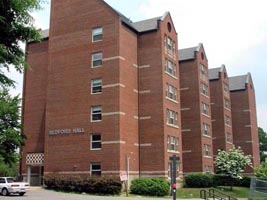
by Gabriella Pisano ’18
News Staff
There are many factors that affect what an average college student worries about throughout the day. Keeping up with classes, spending time with friends, and participating in extra-curriculars constantly preoccupy the mind of the student. With all these concerns floating around, the Office of Residence Life is doing its part to make housing one less problem for students at Providence College.
Residence Life is making a few changes to housing. Next year is the first year that juniors are not permitted to live off campus, which means that more juniors will need on-campus housing than ever before.
Junior year housing is already difficult due to the fact that many juniors go abroad for a semester, and Residence Life acknowledges that it can be extremely difficult for juniors to form full groups to fill rooms.
In an effort to aid students, Residence Life is allowing sophomores and juniors to live together to give students a larger pool to pick from for housing.
Jana Valentine, director of the Office of Residence Life, said that in the past, students have asked if it was possible for juniors and sophomores to live together and were told no. Now, Residence Life is accommodating these students.
Valentine and Steven Sears, dean of students and the associate vice president for student affairs, discussed the change and sought out student feedback. Sears stated that he asked Student Congress for their thoughts on the matter, and that both resident assistants and hall directors were also consulted.
While the decision was made in the hopes of filling gaps in junior housing, that is not the primary concern of Residence Life.
Valentine stated, “I want students to live with other students that they’re compatible with. I want students to have great experiences with their roommates. Sometimes that doesn’t happen because of class year restrictions. Having first year students live with other first years is a very positive experience, but I believe that there is a lot of mentoring that can happen within class years at levels above first year.”
In past years, juniors and seniors have been permitted to live with one another. The feedback from students who have taken advantage of this opportunity has been primarily positive.
Claire Kleinschmidt ’17 is one of these students. When asked about her thoughts on allowing students of different class years to live together, Kleinschmidt responded, “Living with seniors as a junior allowed me to meet and engage with a new group of PC students and really become more a part of the campus community.
“I learned so much from them and their experience transitioning out of PC that I felt really prepared for senior year,” she continued. “Now, as a senior with a few junior roommates, I have really enjoyed being able to live with people I have formed close relationships with, regardless of their class year.”
In addition to this change, an entire floor in Fennell Hall will be reserved for first year students. In the past, freshmen have requested single rooms and Residence Life was unable to accommodate.
With this change, Special programming and community building will take place in order to ensure a comfortable community for first year students living alone.
Residence Life hopes that these changes will give students better living environments and allow them to dedicate more time and energy to other pursuits, ensuring that stresses of college do not revolve around housing.
Preview: Alumni & Family Weekend ’17
by The Cowl Editor on February 10, 2017
News
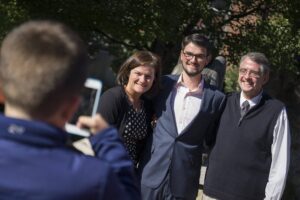
By Gabriela Pisano ’18
News Staff
With Providence College celebrating its Centennial year, there have been many special events happening throughout the school year. There are also annual events like Alumni & Family Weekend, which celebrates the Friar Family and is full of PC Pride.
This year’s Alumni & Family Weekend, taking place on Feb. 10-12, has special events planned due to it being the Centennial year. With more than 1,700 people registered, the many events are estimated to have high attendance. Giving guests the opportunity to see changes to the campus, the welcome reception for families will take place in the Arthur F. and Patricia Ryan Center for Business Studies from 4:30-6:30 p.m.
The Centennial exhibit located on the second floor of the Harkins Rotunda will be officially unveiled during Dinner with the Dominicans. At the dinner, Chaplains Rev. Peter Martyr Yungwirth, O.P., Rev. Philip Neri Reese, O.P., and other Dominicans will talk about the Peer Ministry Program and join attendees for dinner.
On Saturday at 10 a.m., President Rev. Brian J. Shanley, O.P. ’80, will give the opening remarks of the weekend, offering updates on the College news and welcoming our featured speaker, Doris Burke ’87. Burke is a three-time All-Big East Basketball player at PC who went on to enter the world of television sports broadcasting. Burke will share the story of her journey in her speech “A Basketball Life.”
The weekend includes diverse elements of academics, athletics, and the Arts. A number of academic based events will be held throughout the day on Saturday. From discussing the future of ObamaCare to having a mock Development of Western Civilization class about race, marginality and theologies of liberation, a wide variety of topics will be covered.
In addition to these events, there will be information sessions. Students and parents interested in Study Abroad opportunities will have the opportunity to attend a “Know Before They Go” session. The Center for Career Education & Professional Development is also hosting a “Discern and Prepare for Who You Will Be” session to prepare graduates for success after PC.
Multiple sporting events are taking place over the course of the weekend as well. Though the Friar Men’s Hockey Game is sold out, there is a game watch and pep rally to be held in ’64 Hall. The Men’s Basketball game against Butler is at 4p.m. on Saturday. There is a game watch for this game happening at the Rhode Island Convention Center followed by the PC 100 Bash.
During the PC 100 Bash, the PC Department of Athletics will honor a group of past PC athletes by retiring their jerseys. Among those to be honored are Otis Thorpe ’84; the late Bruce “Soup” Campbell ’78; Doris Burke ’87 ’92G, ’05Hon; Lou Lamoriello ’63 ’01Hon; Ron Wilson ’77; and Cammi Granato ’93 ’12G.
The PC 100 Bash already has 800 people scheduled to attend, but those who have yet to register are still welcome and encouraged. Student buses will begin running at 2 p.m. before the game, and additional buses will loop from PC to the Dunkin’ Donuts Center from 6-11:30 p.m.
Deirdre Driscoll-Lemoine, director of college events says, “Come down to the convention center, even if you haven’t registered. There will be plenty of free food. It’ll be on the fourth floor overlooking the beautiful city. Everyone is welcome. The theme of this whole weekend is celebrating being Forever a Friar Family.”
As for the Arts, the Department of Theatre, Dance, and Film will be having performances of The Laramie Project on Friday and Saturday night at 8 p.m. and Sunday at 2 p.m. Additionally, celebrating the 20th anniversary of A cappella at PC, the A cappella groups will perform at the PC 100 Bash at 8pm.
Alumni & Family Weekend is a highlight of the PC acadmic year. Driscoll-Lemoine stated, “College Events, Alumni Relations, and the Office of Institutional Advancement worked together on planning the weekend. I like to call this weekend an across campus collaboration. There are so many people involved in making all of this happen.”
Off-Campus Beat: Immigration Ban
by The Cowl Editor on February 3, 2017
News

By Gabriella Pisano ’18
News Staff
This past week all news sources, from newspapers to social media, have been full of stories about President Donald Trump’s immigration ban. On Friday, January 27, President Trump signed an executive order that affected the lives of many refugees and immigrants.
The executive order had many parts to it. In addition to blocking citizens of Iran, Iraq, Libya, Somalia, Sudan, Syria, and Yemen from entering the United States for 90 days, the order also indefinitely bars Syrian refugees from entering the U.S. and suspends all refugee admissions for 120 days.
While many of these policies are temporary, a cap has also been placed on the number of refugees to be accepted into the U.S. in 2017. Instead of the 110,000 limit set by former President Obama, there is now a cap of 50,000.
Due to the executive order, many people were detained at airports throughout America. This sparked protests, and many called the ban un-American. The countries included in the executive order are predominantly Muslim.
President Trump states, “To be clear, this is not a Muslim ban, as the media is falsely reporting. This is not about religion, this is about terror and keeping our country safe.”
“There are over 40 different countries worldwide that are majority Muslim that are not affected by this order,” he continued. “We will again be issuing visas to all countries once we are sure we have reviewed and implemented the most secure policies over the next 90 days.”
Despite President Trump’s statement, many activists are arguing that Trump is stigmatizing all Muslims in an attempt to improve policies to prevent terrorism.
Trump stands by his statement claiming that the ban is on those seven countries not because of religion but because of the ties these countries have to terrorism.
With so much change happening only weeks into his presidency, people around the world are wondering what is to come. Looking back at the history of immigration in the United States, other restrictions based on national origin are apparent.
Many are questioning how this affects those who were traveling at the time the order was passed. The order states, “The Secretaries of State and Homeland Security may, on a case-by-case basis, and when in the national interest, issue visas or other immigration benefits to nationals of countries for which visas and benefits are otherwise blocked.”
Rience Priebus, white house chief of staff, spoke of that discretion stating, “green card holders going forward, it doesn’t affect them. If you are moving in and out of those seven countries, you will be subject to more questions.”
An estimated 109 people were detained at airports or in transit. However, after the American Civil Liberties Union filed a case in response to President Trump’s executive order, a federal judge issued a temporary halt to the deportation of visa holders or refugees at U.S. airports.
Friar Flashback: The COWL
by The Cowl Editor on January 27, 2017
News
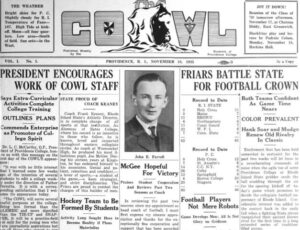
by Gabriella Pisano ’18
News Staff
While the Internet may be a source of news for many, newspapers continue to be one of the more reputable places to find factual news about events. Many different newspapers exist, providing a wealth of different information. The Cowl is Providence College’s very own newspaper.
With its first publication in November 1935, the newspaper has been publishing ever since. Since the first issue of The Cowl, the fact that it is student-run has been emphasized, with each issue stating on the front page “Providence College’s Student-Run Newspaper since 1935.”
As a student-run newspaper, the entire process of writing and assembling the newspaper is up to students. Students choose the topics of articles, discuss subjects, review and edit other student’s materials, design the layouts, produce and distribute the newspapers, as well as solicit advertisers.
In the early years of The Cowl, publications varied in length, but were typically only a few pages long and were published sporadically throughout the years. Now, weekly publications of The Cowl are significantly larger.
Like other newspapers, The Cowl covers a range of topics split into different sections. The main sections that have existed for quite some time include News and Sports. Other sections, such as Arts & Entertainment and Opinion, have existed under other names throughout the publications. Another section in The Cowl is Portfolio. This section is more recent than others. Portfolio includes creative writing pieces as opposed to the other sections that are more news oriented.
Discussing her observations on the changes within The Cowl, last year’s Editor-in-Chief, Kathleen McGinty ’16, stated, “Over time, sections have evolved. Just during my four years on The Cowl, I remember our Commentary section changed to Opinion, and we voted to disband the World News section.”
With many students writing for each section, there are also student copy editors. Each article published in The Cowl goes through three rounds of review by the copy editors. The Editor and Associate Editor in Chief have the final say over what gets published.
Though The Cowl does have an administrative advisor, Richard Kless ’74, students are very much in charge of the newspaper. Explaining his role as advisor, Kless states, “My role is primarily one of guidance, resource, historical reference, but never a controller.”
While there tends to be confusion surrounding the true role of an advisor to a student-run newspaper,
Kless clears this up, stating, “Contrary to popular opinion, an advisor’s role is not to control what the students want to say but to help guide them to express it in such a way that the newspaper serves and informs the PC community.”
The Cowl publishes weekly on Thursdays, and is available around campus. With the emergence of the Internet and improvements in technology, an online publication is also available on thecowl.com.
Kless stated, “Since the explosion of technology it has been suggested from time to time that The Cowl stop being a hard copy paper and go strictly online.”
“Institutions of Higher Learning that have done so often regret it later as it reduces a student ‘paper’ to a few bloggers,” he continued. “It eliminates the opportunities for students to interact face to face with one another. It reduces a club/organization to a handful by ceasing the need for editorial meetings, copy editor reviews of peers’ work, layout opportunities for skills to develop in producing the hard copy, etc.”
Though being available in online form is beneficial, the production of the student-run paper provides students both participating in the production, and those consuming, with skills that will benefit them in the future.
Katherine Puzycki ’17, the current editor-in-chief of The Cowl, stated, “One of the best parts of being the Editor-in-chief of The Cowl is getting to hold a physical copy of the paper in your hands after it’s been printed. To see everyone’s work come to life like that is rewarding in a way that makes me proud to be part of such a great publication and to work with such a talented staff. We pour countless hours each week into making The Cowl a tangible product that the College will always have—it speaks not only to the legacy of our school, but the legacy of each person that has been a part of our paper.”
From Teaching to Learning
by The Cowl Editor on January 19, 2017
News
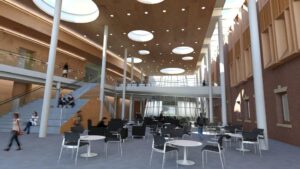
By Gabriella Pisano ’18
News Staff
Classes for the Spring 2017 semester have officially started and the new Arthur F. and Patricia Ryan Center for Business Studies is being used. The campus of Providence College may seem to be ever changing with all of the structural advancements occurring, but academics still remain at the heart of PC’s mission.
In 2012, the Providence College School of Business (PCSB) was awarded accreditation by the Association to Advance Collegiate Schools of Business, or AACSB.
With only 30 percent of business schools within the United States, and five percent worldwide holding this status, the accreditation of PCSB proves that the school is advancing.
In addition to the accreditation, PCSB ranks No. 61 on Bloomberg Businessweek’s 2016 list of the top undergraduate business programs. Providence College attributes much of the School of Business’ success to the College’s 2011 Strategic Plan. This plan “positions the School to be a national and international model for practice-based curriculum that builds on the College’s expertise in the liberal arts and virtue ethics.”
Students and faculty can see the changes that have happened, as Dore Hall became the Ryan Center, but what cannot yet be seen is how the new Center for Business Studies is affecting the academics of PC.
With most of the academic buildings being on upper campus, the placement of the Ryan Center on lower campus works to make lower campus a more central location for students.
With the closing of Huxley Avenue, the upper and lower campuses were unified more than they had been in the past. Now that there are three academic buildings on lower campus, students are expected to spend more time there than before.
Much of the structure of Dore Hall remains and houses the faculty and administrative offices within in the School of Business. The front part of the building is home to classrooms, collaboration pods, and open spaces for studying.
The abundance of open space provides many places for students to study. While the Ryan Center is for Business Studies, all students are welcome to use the space. The building was designed to “foster engaged, values-based learning that will lead students to a lifetime of success in business and in life.”
Associate Dean of the School of Business, Dr. Daniel Horne, stated, “With the technology we have in the world today there is an integration of ideas. Business alone isn’t enough, there is a need for liberal arts. The official dedication of the building has not yet taken place, but classes are already in session.”
Students are already taking advantage of the new space available to them. Simran Madhani ’18 had her first class of the semester in the new Ryan Center. Madhani stated, “Having my first class of the semester in the Ryan Center was definitely something I was looking forward to! With the innovative technology and all the natural lightening in the spacious classrooms, both professors and students were in an exceptional setting to have a productive class experience.”
Business classes used to take place in buildings such as Feinstein. Many of these classes are lecture style in which the professor stands up front and lectures to the students.
Dr. Horne stated, “The Ryan Center encourages an active learning style. The classrooms are designed to be interactive. While the ‘sage on the stage’ method of teaching was popular in the past, interactive teaching is more effective.”
Victoria Palmer ’18 commented on a classroom in the Ryan Center, stating, “I liked how the classroom was spacious and bright. It was nice to be an environment where the desks weren’t extremely close together and cramped. The whole building had a really welcoming vibe and everyone was so excited.”
PCSB is continuing to develop, and the new building is proof of this. Dr. Horne stated, “The focus was always on teaching. Now, we’re shifting the focus from teaching to learning.”
